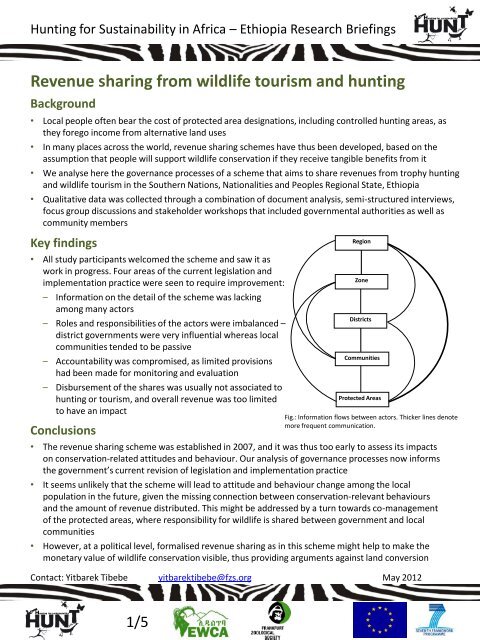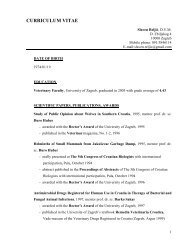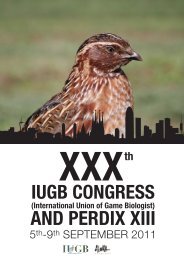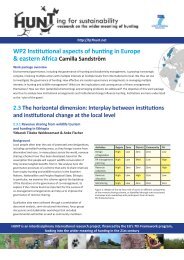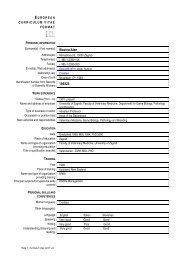Hunting for Sustainability in Africa
Hunting for Sustainability in Africa
Hunting for Sustainability in Africa
Create successful ePaper yourself
Turn your PDF publications into a flip-book with our unique Google optimized e-Paper software.
<strong>Hunt<strong>in</strong>g</strong> <strong>for</strong> <strong>Susta<strong>in</strong>ability</strong> <strong>in</strong> <strong>Africa</strong> – Ethiopia Research Brief<strong>in</strong>gs<br />
Revenue shar<strong>in</strong>g from wildlife tourism and hunt<strong>in</strong>g<br />
Background<br />
• Local people often bear the cost of protected area designations, <strong>in</strong>clud<strong>in</strong>g controlled hunt<strong>in</strong>g areas, as<br />
they <strong>for</strong>ego <strong>in</strong>come from alternative land uses<br />
• In many places across the world, revenue shar<strong>in</strong>g schemes have thus been developed, based on the<br />
assumption that people will support wildlife conservation if they receive tangible benefits from it<br />
• We analyse here the governance processes of a scheme that aims to share revenues from trophy hunt<strong>in</strong>g<br />
and wildlife tourism <strong>in</strong> the Southern Nations, Nationalities and Peoples Regional State, Ethiopia<br />
• Qualitative data was collected through a comb<strong>in</strong>ation of document analysis, semi-structured <strong>in</strong>terviews,<br />
focus group discussions and stakeholder workshops that <strong>in</strong>cluded governmental authorities as well as<br />
community members<br />
Key f<strong>in</strong>d<strong>in</strong>gs<br />
• All study participants welcomed the scheme and saw it as<br />
work <strong>in</strong> progress. Four areas of the current legislation and<br />
implementation practice were seen to require improvement:<br />
– In<strong>for</strong>mation on the detail of the scheme was lack<strong>in</strong>g<br />
among many actors<br />
– Roles and responsibilities of the actors were imbalanced –<br />
district governments were very <strong>in</strong>fluential whereas local<br />
communities tended to be passive<br />
– Accountability was compromised, as limited provisions<br />
had been made <strong>for</strong> monitor<strong>in</strong>g and evaluation<br />
– Disbursement of the shares was usually not associated to<br />
hunt<strong>in</strong>g or tourism, and overall revenue was too limited<br />
to have an impact<br />
Conclusions<br />
Region<br />
Zone<br />
Districts<br />
Communities<br />
Protected Areas<br />
Fig.: In<strong>for</strong>mation flows between actors. Thicker l<strong>in</strong>es denote<br />
more frequent communication.<br />
• The revenue shar<strong>in</strong>g scheme was established <strong>in</strong> 2007, and it was thus too early to assess its impacts<br />
on conservation-related attitudes and behaviour. Our analysis of governance processes now <strong>in</strong><strong>for</strong>ms<br />
the government’s current revision of legislation and implementation practice<br />
• It seems unlikely that the scheme will lead to attitude and behaviour change among the local<br />
population <strong>in</strong> the future, given the miss<strong>in</strong>g connection between conservation-relevant behaviours<br />
and the amount of revenue distributed. This might be addressed by a turn towards co-management<br />
of the protected areas, where responsibility <strong>for</strong> wildlife is shared between government and local<br />
communities<br />
• However, at a political level, <strong>for</strong>malised revenue shar<strong>in</strong>g as <strong>in</strong> this scheme might help to make the<br />
monetary value of wildlife conservation visible, thus provid<strong>in</strong>g arguments aga<strong>in</strong>st land conversion<br />
Contact: Yitbarek Tibebe yitbarektibebe@fzs.org May 2012<br />
1/5


